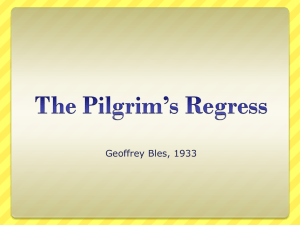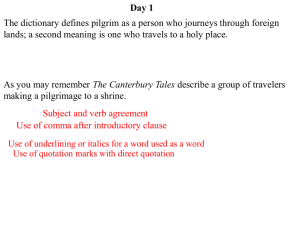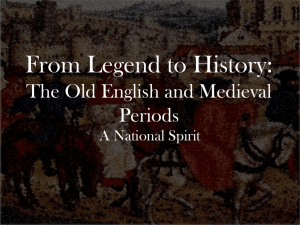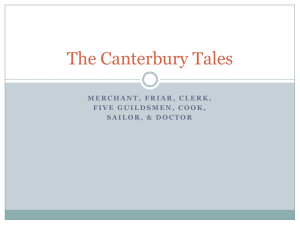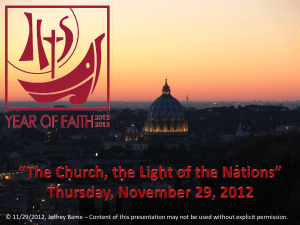Name that Pilgrim (General Prologue of Canterbury Tales Review
advertisement
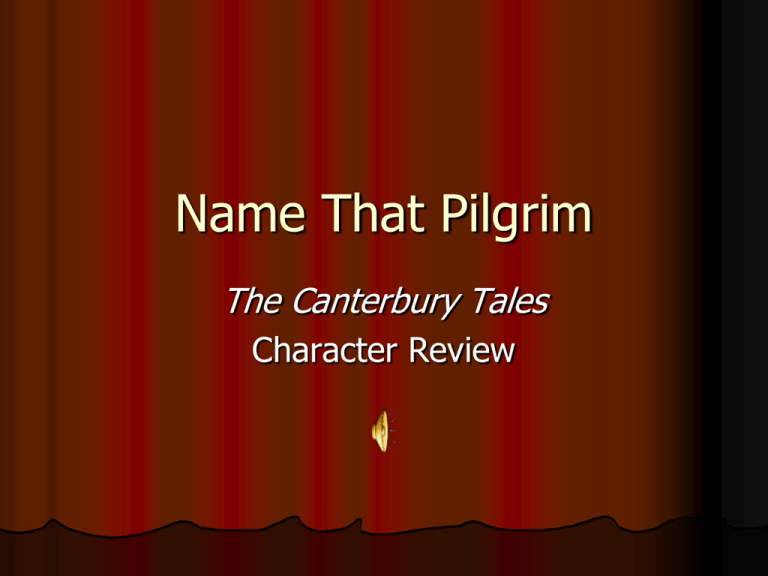
Name That Pilgrim The Canterbury Tales Character Review Game Rules Pick a Team Captain. Pick a pilgrim of the game board. Description will be on the screen and three choices. Your team’s job-Give the correct name of the pilgrim being described. Get it right-earn a point! A wrong answer-goes to the next row. Name That Pilgrim! 1-5 6-10 11-15 16-20 21-23 Pilgrim 1 Pilgrim 6 Pilgrim 11 Pilgrim 16 Pilgrim 21 Pilgrim 2 Pilgrim 7 Pilgrim 12 Pilgrim 17 Pilgrim 22 Pilgrim 3 Pilgrim 8 Pilgrim 13 Pilgrim 18 Pilgrim 23 Pilgrim 4 Pilgrim 9 Pilgrim 14 Pilgrim 19 Pilgrim 5 Pilgrim 10 Pilgrim 15 Pilgrim 20 Review Info Pilgrim One “…..and he would help the poor for the love of Christ and never a penny…” “He paid in tithes in full when they were due” “On what he owned, and on his earrings too.” Plowman, Host, or Physician Plowman a simple, honest farmer who lived in peace and paid his dues to the church. Pilgrim Two “Bold in his speech, yet wise and full of tact,/There was no manly attribute he lacked.” “What’s more, he was a merry-hearted man.” Miller, Host, or Cleric? Host Accompanies the group and suggests that each pilgrim tell four tales, a pair on the way, and a pair on the way back. The pilgrim who tells the best tale will be treated to dinner by the others back at the Tabard Inn. Pilgrim Three “Yet he was rather close as to expenses” “And kept the gold he won in pestilences.” God stimulated the heart, or so we’re told” “He therefore had a special love of gold.” Miller, Physician, or Franklin? Physician Knows everything about medicine, but seems to know little about the Bible. He apparently made a ton of money during the plague, but never appears to spend any of it. Pilgrim Four “And he was under contract to present” “The accounts, right from his mater’s earliest years.” “No one ever caught him in arrears.” Miller, Summoner, or Reeve? Reeve a short-tempered, skinny man who managed an estate. Pilgrim Five “A wrangler and buffoon, he had a store” “Of tavern stories, filthy in the main.” “He was a master-hand at stealing grain.” Miller, Skipper, or Cleric Miller A thick-shouldered man who could wrestle with the best of them. A large wart on his nose only served to strengthen his imposing appearance. Pilgrim Six “Garlic he loved, and onions too, and leeks, And drinking strong wine till he was hazy.” “The he would should and jabber as if crazy, And wouldn’t speak a word except in latin” “When he was drunk, such tags as he was pat in.” Summoner, Skipper, or Franklin? Summoner An ugly servant of the church court. Though he is paid to bring sinners to court, he quickly accepts bribes to look the other way. He enjoys women of "questionable reputation" and lots of wine, occassionally spouting off some Latin after indulging himself. Pilgrim Seven “As for his skill in reckoning in tides, Current and many another risk besides” Moons, habours, pilots, he had such dispatch” “That from Hull to carthage none was his match.” Miller, Cleric, or Skipper? Skipper A very large man who was at ease on the water. Though he knew of every port in the Mediterranean, he looked awkward sitting on a horse. Pilgrim Eight “His house was never short of bake-meat pies, Of fish and flesh, and these in such supplies…” “It positively snowed with meat and drink And all the dainties that a man could think.” Reeve, Franklin, or Cleric? Franklin A smooth talker, who knows a good bargain when he sees it. In fact, his slick demeanor helps hide the fact that he is really in debt. Pilgrim Nine “…..his horse was thinner than a rake” “And he was not too fat, I undertake, But had a hollow look, a sober stare; The thread upon his overcoat was bare.” Cleric, Plowman, or Host? Cleric A very soft-spoken student of the Arts. When he did speak, it was with such eloquence that people readily listened. He is one of the most admired pilgrims. Pilgrim Ten “He knew of every Judgement, case and crime” “Recorded since King William’s time.” “He could dictate defences or draft deeds; No one could pinch a comma from his screeds,” “And he knew every stateute off by rote.” Cook, Lawyer, or Friar? Lawyer A meticulous attorney who could recite seemingly any judgement to the letter. His abilities earned him high praise among others, although the reader gets the sense that their may be more to him than meets the eye. Pilgrim Eleven “He knew the taverns well in every town” “And every inkeeper and barmaid too” “Better than lepers, beggers and that crew” “He kept his tippet stuffed with pins for curls, And pocket-knives, to give to pretty girls.” Friar, Manciple, or Lawyer Friar A bad guy. He is licensed to hear confessions and uses his position to beg people for money, operating under the assumption that penance works better through payment than prayers. He also has the reputation of getting girls into "trouble", then helping to marry them. Pilgrims Twelve “…..so (he) had set His wits to work, none knew he was in debt…” “He was so stately in negotiation, Loan, bargain, and commercial obligation.” Merchant, Guild, or Parson Merchant A smooth talker, who knows a good bargain when he sees it. In fact, his slick demeanor helps hide the fact that he is really in debt. Pilgrim Thirteen “Their wisdom would have justified a plan” “To make each one an alderman” “They had capital and revenue, Besides their wives declared it was their due.” Merchant, Guild, or Cook? Guild Chaucer tells us that the guild is an extremely vain individual, taking pains to improve his appearance. The issue of vanity throughout the Canterbury Tales is an interesting one. Pilgrim Fourteen “He stayed at home and watched his fold” “So that no wolf should make the sheep miscarry.” “He was a shepherd and no mercenary.” Pardoner, Cook, or Parson? Parson A shining example of what a religious person should be. A poor man, he prefers to give what money he has to others. Appropriately enough, his tale is the final one told. Pilgrim Fifteen “He’d sewed a holy relic in his cap; His wallet lay before him on his lap” “Brimful of pardons come from Rome all hot. He had the same small voice as a goat has got.” Pardoner, Friar, or Cook? Pardoner One of the most corrupt of the churchmen, he sells pardons for sins to the highest bidder. Beardless with a high-pitched voice, he is referred to by Chaucer as "a gelding or a mare." Pilgrim Sixteen “In company she liked to laugh and chat” “And knew the remedies of love’s mischances, An art in which she knew the oldest dances.” Wife of bath, guild, or nun? Wife of Bath Married five time over she knew everything there was to know about the ways of love. A veteran of several pilgrimmages like this one, she appears to use these trips to meet guys. Pilgrim Seventeen “…..he was never rash/Whether he bought on credit or paid cash.” “He used to watch the market most precisely and got in first, and so he did quite nicely.” Manciple, Pardoner, or Cook Manciple Worked at a law school, where he was in charge of feeding the prospective lawyers. Though not as smart as the students, he was a shrewd enough buyer to put away some money for himself. Pilgrim Eighteen “But what a pity-so it seemed to me, That he should have an ulcer on his knee. As for blancmange, he made it with the best.” Cook, Pardoner, or Friar? Cook Knew how to prepare the finest food, but the oozing sore on his shin looks decidedly similar to one of his best dishes, creamed chicken pie. Chaucer notes the shame of such matters. Pilgrim Nineteen “And in his hands he bore a mighty bow.” “His head was like a nut, his face was brown, He knew the whole of woodcraft up and down.” Knight, Yeoman, or Nun? Yeoman An assistant to Knight and Squire. We know very little about him, except that he shoots the bow and arrow well. The Yeoman does not tell a tale. Pilgrim Twenty “…..a most distinguished man, who from the day on which he first began” “To ride abroad had followed chivalry, Truth, honour, generousness and courtesy.” Yeoman, Knight, or Monk? Knight The reader is given the picture of a Middle English nobleman. He has fought in many wars, but is careful not to brag about his conquests. Clearly, the Knight is the most admired of the pilgrims, and not coincidentally, tells his tale first. Pilgrim Twenty-One “Her forehead, certainly, was fair of spread” “Almost a span across the brow, I own; She was by no means undergrown.” Nun, Wife of bath, or Guild Nun A character full of contradictions. Though she is a nun whose duties should be pledged to God, she certainly considers herself a lady first. She spoke bad French, ate and dressed very carefully, and wore a brooch that said "love conquers all." She also cared deeply for animals, bringing several along with her on the pilgrimage. Her lady-like demeanor would seem to stand in direct contrast to the ways of a good Nun. Pilgrim Twenty-Two “He liked a fat swan best, and roasted whole.” “His palfrey was a brown as is a berry.” Yeoman, Knight, or Monk Monk An outdoorsmen , the Monk loved to ride horses and hunt. He also ate well and dressed in nice clothes. He even goes so far as to say that he prefers the outdoor life, hardly a statement one would expect from one whose profession entails sitting inside and copying books. Pilgrim Twenty-Three “Singing he was, or fluting all the day; He was as fresh as is the month of May.” Squire, Host, or Guild? Squire Knight’s son, long curly hair, 20 yrs.old, passionate,ladies man, knight in training, short gown w/ embroidered flower Need some review help on the Pilgrims? All facts found at: http://webpages.shepherd.edu/m austin/engl208/canterbury.html
